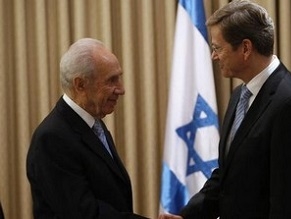|
World Jewish News

President Shimon Peres and German Foreign Minister Guido Westerwelle, November 7, 2010. Photo: REUTERS/Ronen Zvulun
|
Westerwelle: Nuclear Iran is not an option for Germany
17.05.2013, Israel and the World "Iran wants an option of nuclear arms, but this is not an option for Germany, we stand by our friends," German Foreign Minister Guido Westerwelle told President Shimon Peres on Friday. Westerwelle met with Peres in the late afternoon after meeting with Prime Minister Binyamin Netanyahu.
Westerwelle arrived in Israel on Friday for a day of talks in Jerusalem with Israeli leaders, and a day of talks Saturday with Palestinian Authority leaders.
The economic sanctions which have been imposed on Iran have left an imprint, said Peres, and should be continued until at least the upcoming elections in June. At the same time, he said, support has to be shown for the Iranian people who are suffering not because of the sanctions, but because of their leadership. There should be no compromise while the Iranians continue to build nuclear bombs and to sponsor terror, Peres insisted.
Westerwelle spoke at length in his meetings with President Peres and Prime Minister Netanyahu about US Secretary of State John Kerry's initiative to restart the Israeli-Palestinian peace process.
"Germany is 100 per cent committed to support the efforts of Kerry to revitalize and relaunch negotiations between Israel and the Palestinians which is not only in the interests of the region, but the whole world," Westerwelle told Peres. He underscored the essentials of confidence building measures and said that it was important not just to talk but to act.
At the outset of the meeting, Peres expressed appreciation to Westerwelle for his address to the plenary of the World Jewish Congress in Budapest earlier this month in which he referred to Israel's security needs, the threats to Israel's existence and the need for Israel and the Palestinians to work out a two-state solution to their differences and to live as good neighbors.
Peres commended Westerwelle on delivering an address that was "profound, sincere and to the point," adding that Israel appreciates the support of Germany on most of the issues which Israel is confronting.
The Middle East, he said, is facing an unprecedented situation. "Whereas we used to worry about frontiers, we are now worried about states which have lost their coherence and are divided rather than united."
Peres emphasized that terror is also dividing the Middle East, because there are so many terrorist organizations with no respect for religious, ethnic or cultural values. "The policy of the terrorists is terror," he said.
He was also concerned that although the Cold War has long been over, Russian and Chinese attitudes continue to differ vastly from those of the West.
"What we have to do is to bring as soon as we can an end to the conflict between us and the Palestinians," he said.
Peres has consistently stated that the gaps between the Israeli and Palestinian positions are smaller than most people realize. Continuing on this theme he said that the conflict is more vocal than real. "It's more in headlines than real lines. We all have to show support for John Kerry's mission in real terms," he insisted. "If we don't we will betray our own desire to bring peace to the Middle East. We have to be dynamic and mobilize to increase hope."
Westerwelle echoed his messages of support to Israel in his meeting with Prime Minister Netanyahu earlier in the day. Germany "stands alongside Israel" during this challenging period in the region, he said.
Westerwelle said that the German-Israeli relationship was not only a "strategic alliance," but also a friendship between societies, people and governments.
Neither Westerwelle nor Netanyahu referred in their opening statements to a recent hiccup in the relationship, first reported Monday by The Jerusalem Post, having to do with Germany's announcement that it will seek membership in the UN Security Council in 2019. By doing so, Berlin is weakening Israel's chance to win its first ever seat on the body that year.
Israel announced already in 2005 it was putting forth its candidacy for the 2019 slot as part of the Western Europe and Other (WEOG) regional grouping. Belgium has also put forth its candidacy for the position.
Israel is the only country in the region, and one of the few countries in the UN, that has never sat on the Security Council, a body that historically has had a tremendous impact on Israel and the region. The issue is to be raised during Westerwelle's talks.
In addition to meeting Netanyahu and Peres, Westerwelle is also meeting on Friday with Finance Minister Yair Lapid, Justice Minister Tzipi Livni and MK Avigdor Liberman.
Netanyahu, before the meeting, called Westerwelle, German Chancellor Angela Merkel and Germany "friends" of Israel.
Netanyahu said that the Middle East was in a period of unprecedented instability, and that he was closely following the challenges that the fluid situation was posing to Israel.
In a possible reference to his recent lightning visit to Russia and a meeting with Russian President Vladimir Putin, Netanyahu said he would travel wherever is needed, and meet with whoever necessary, to ensure Israel's security.
By HERB KEINON, GREER FAY CASHMAN
JPost.com
|
|
